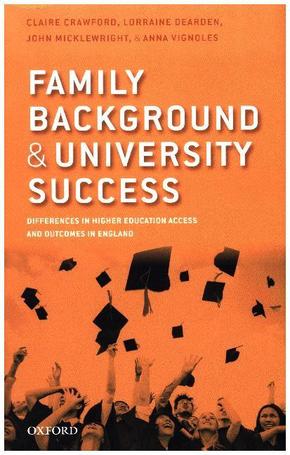
Family Background and University Success - Differences in Higher Education Access and Outcomes in England
| Verlag | Oxford University Press |
| Auflage | 2016 |
| Seiten | 178 |
| Format | 15,3 x 22,4 x 1,4 cm |
| Print PDF | |
| Gewicht | 328 g |
| Artikeltyp | Englisches Buch |
| ISBN-10 | 019968913X |
| EAN | 9780199689132 |
| Bestell-Nr | 19968913EA |
The volume examines why young people from poorer families are less likely to go to university than their counterparts in richer families, the impact of the 2006 and 2012 reforms, who does best at university once they are there, and who succeeds in the labour market following graduation.
Why do fewer teenagers in England from disadvantaged backgrounds go to university than young people from better-off families? Once at university, how well do poorer students fare compared with other students - who drops out from university and who gets the best degrees? After university - who secures better jobs and higher pay? What really has been the impact on university entry of the controversial increases in tuition fees in 2006 and 2012, especially for students from poorer families? Is there no alternative to charging for university places and what do other countries do? What should governments, universities, and schools do to reduce the gaps in university entry and success by family background? And what advice can be given to families and young people themselves deciding between the costs and benefits of university? This book answers these questions using the latest available evidence, drawing on a wealth of data from administrative records of the school and university syste m and sample surveys of young people and their families. The authors' analysis of the situation in England is set against a background of evidence for other countries. The book provides much needed dispassionate analysis of issues that are at the forefront of both public policy and popular debate on higher education around the world today.
Inhaltsverzeichnis:
1: Family background and university success - what are the issues?
2: Why and how do governments fund higher education?
3: How is university teaching funded in England?
4: Have recent funding reforms widened the family background gaps?
5: What is the role of prior attainment?
6: When and how to intervene to increase university attendance?
7: Is getting pupils from poorer backgrounds through the doors enough?
8: Do socio-economic differences persist beyond university?
9: What do we conclude?
